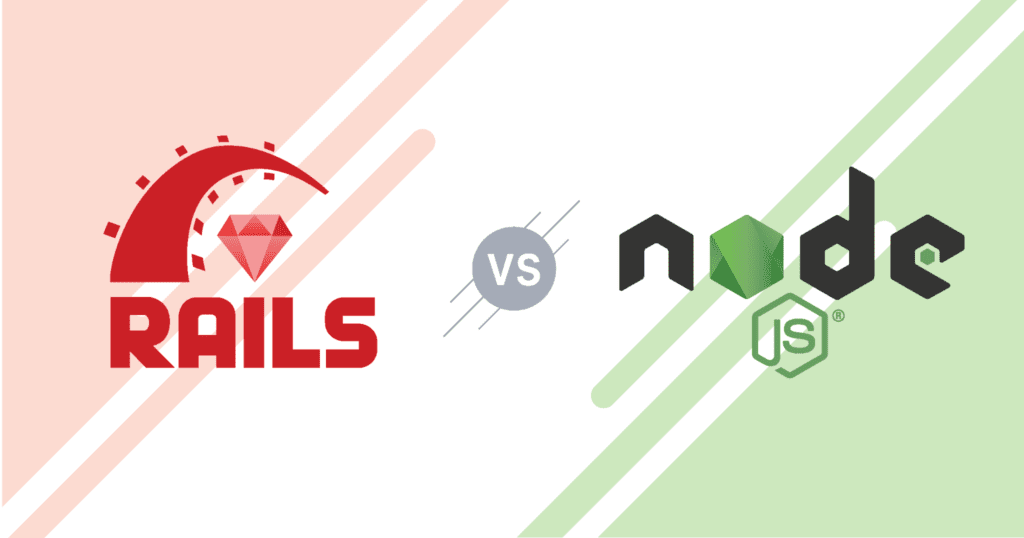
When it comes to web development, developers look for sustainable, effective, and easy-to-operate frameworks. Choosing the right framework depends on a variety of factors, amongst which preferences, objectives, and the utilities of the platform stand to be most important.
While developers need both front-end technologies and back-end frameworks, choosing the front-end framework is relatively easier. The most common choices made by developers for front-end technologies are between HTML, JavaScript, and CSS5.
Although when it comes to backend frameworks, there is a range of options with a variety of features, functionalities, and utilities. This makes the choice of the right back-end framework more complicated and even confusing. Some of the most popular choices for back end technology includes:
- Ruby on Rails (ROR)
- Django
- Node.js
- PHP
That being said, Ruby on Rails (ROR) and Node.js are the two most popular and trusted platforms for back-end development. In this article, we will offer you a detailed, comprehensive, and unbiased comparison between the two platforms based on their features, functionalities, and applications.
There are a variety of parameters of the two frameworks which include their performances, scalability, development speeds, and other factors that are compared in detail in the next part of this article.
Node.Js: An Overview
Node.Js is a highly functional server-side, Javascript-based runtime environment that is also an excellent open-source tool. Statistics suggest that almost 85% of Node.js developers use it for web app development, and almost 43% of them use it for enterprise-grade applications. The platform is known for its high performance and scalability. It makes use of single-thread processes for web loads and async programming.
The platform is designed with real-time and push-based architectures. The platform is highly effective and extensively used for building single-page applications, websites, and backend API services. According to the Stackoverflow Developer Survey Report 2020, over 66% of developers said that Node.js is their favorite backend framework. It also comes with Node.Js-based frameworks such as Express, Socket.io, and Meteor.js to improve the backend capability of a project.
Key Applications of Node.Js
Talking use cases of Node.Js, it has a vast and versatile range of applications across various fields. Let us take a look at some of them:
- Streaming web applications
- IoT based applications
- Backends and servers
- Developing APIs
- Scripting and automation
- Real-time software
- Chat applications
- Complex Single-page apps
- Microservices
Pros and Cons of Node.Js
Every backend platform has some advantages and disadvantages. Node.Js is no exception. Let us take a look at them as well.
Pros
- Offers great freedom of coding to developers
- Helps build everything from scratch
- Non-blocking I/O system
- Better scalability and fast performance allowing simultaneous processing of multiple requests
- Active, vast, and supportive community
- Easy to learn
- Developers can write both frontend and backend with JavaScript
- Enables caching of modules in application memory to reduce re-execution of codes
- Faster response times
- Great support with great solutions codes and tools to enable testing and identification of project dependencies
Cons
- Loss of productivity as everything needs to be written from scratch
- Does not do well in the case of heavy computing apps
- Does not support multi-threaded programming
- Asynchronicity leads to difficulty in code maintenance
Major Organizations using Node.Js
Here are some popular and major organizations using Node.Js in their operations:
- NASA
- Netflix
- Trello
Ruby on Rails (ROR): An Overview
Also known as Rails or RoR, this is another very popular open-source, server-side web application framework that is written in Ruby. According to SimilarTech, there are over 394,000 websites powered by RoR. The framework is a really amazing beginner-friendly platform. It helps in the easy building and deployment of highly functional full-stack web applications and websites.
Key Applications of ROR
The platform is used in a wide range of field and the key areas of applications include:
- Web applications
- MVPs
- eCommerce applications
- Social-networking applications
- Cloud-based apps with complex database
Pros and Cons of ROR
ROR comes with a set of distinct advantages and disadvantages that makes it more preferable for certain development activities and are preferred by developers. Based on these pros and cons, businesses make decisions regarding hiring RoR Developers from India. Let us take a look at the pros and cons.
Pros
- Quicker development enabled by the developer-friendly and object-oriented nature
- Less costly and cost-effective
- Highly supportive community
- Easy testing options
- Convention over configuration feature enables smoother production cycles
Cons
- Lacks flexibility
- Greater chances of making architectural mistakes at the initial stages of development
- Improper database management
- Run-time speed is slow
Major Organizations Using ROR
Some known apps and companies using ROR for their development processes are:
- GitHub
- Airbnb
- Slideshare
- Bloomberg
- Basecamp
ROR vs Node.Js: Feature-Based Comparison
Now that we have taken a look into the overview of both the platforms and how they stand against each other, let us now compare the two platforms based on their key features and functionalities. For developers who are confused about which backend framework to use, this comparison will offer great guidance to make the best choice.
Performance
Assessing the performance of the backend framework you are using is essential for large and complex projects. Node.Js is asynchronous and non-blocking and has a perfect environment for micro-operations/tasks without affecting the primary application thread. The V8 Javascript engine enables more efficient and fast multitasking.
ROR loses out when it comes to fast and efficient performance especially when there’s high traffic.
Architecture
RoR follows the MVC (Model View Controllers) architecture while Node.Js uses Single-threaded event loop architecture. It enables multiple concurrent requests with high performance as well as the use of MVC/ MVP architecture patterns. While Node.Js enables faster and flexible module development and RoR reduces the work for developers.
Scalability
Node.Js is a clear winner and is known for building highly scalable applications while RoR requires more resource investment for scaling.
Ease of Testing
RoR is a winner in the case of testing with really easy testing facilities within the framework. Node.Js also enables testing and has debugging capabilities through its ecosystem of third-party packages.
Final Thoughts
All that being said, the preferences of the developers, their experience in the field, and the kind of applications they are using these backend frameworks for, will be essential in deciding which is a better platform to use. We hope you now have a clear understanding of both the platforms and how they stand against each other. Make a choice based on your inferences and how you want to use them for various development purposes.

Author Name:- Harikrishna Kundariya
Biography:- Harikrishna Kundariya, a marketer, developer, IoT, ChatBot & Blockchain savvy, designer, co-founder, Director of eSparkBiz Technologies, A Mobile App Development Company. His 8+ experience enables him to provide digital solutions to new start-ups based on IoT and ChatBot.
Website URL:- https://www.esparkinfo.com/
Social Media Profiles:-
Twitter: https://twitter.com/eSparkBiz
Facebook: https://www.facebook.com/esparkbiz
LinkedIn:- https://www.linkedin.com/in/harikrishna-kundariya-7a71693a/
Discover more from TheLatestTechNews
Subscribe to get the latest posts sent to your email.

Thanks for sharing such an amazing article, really informative.
on-demand mobile app development company